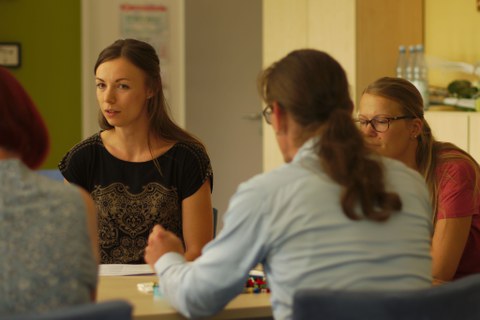Participatory research and technology development of health-promoting interventions
Table of contents
Concerns
Due to the complexity of technological advances and social challenges, an interdisciplinary approach and participatory design of research and technology development are becoming increasingly important. Change in our society requires not only innovative solutions, but also an inclusive approach that takes into account the diversity of perspectives and needs. In order to develop effective and sustainable solutions, it is essential to include the voices of all those affected.
Participation in research and technology development ensures that the affected communities are actively involved in the process and that their needs, values and experiences can be incorporated. Participatory design enables the confluence of different expertise and experiences, which can lead to more holistic and effective solutions. This collaboration helps to identify hard-to-reach worlds of experience that may be overlooked in isolated research approaches.
Another crucial aspect is the promotion of trust and acceptance in relation to new technologies. Often, concerns and resistance arise in the population when technological innovations are not developed transparently or in a participatory manner. Involving communities from the outset creates understanding, minimizes mistrust and enables democratic co-design of technologies that will shape our future.
Last but not least, participation in research and technology development promotes a democratic culture of knowledge sharing and education. It enables people to actively participate in scientific discourse, strengthen their skills and develop a deeper understanding of complex issues.
Main topics
- Involving different stakeholder groups in participatory research and technology development processes
- Testing and evaluation of participatory research and technology development methods
- Intensity of participation in different methodological approaches
- Success factors for participatory research and technology development
Research question
The central concern of the research group is to investigate how concretely joint knowledge generation and technology development can take place with different stakeholder groups and those affected in their everyday lives. A further research interest lies in analyzing the interaction between gaining knowledge and initiating change as goals of participatory research.
- How can different stakeholder groups be involved in participatory research and technology development processes?
- Which methodological approaches are suitable for participatory technology development and participatory research into the lifeworld of different stakeholder groups?
- To what extent can different methodological approaches be used to achieve different levels of participation?
- What are the success criteria for participatory research and technology development? How can the methods be evaluated?
Research approaches and methods
Within the research group, participation is viewed from two different perspectives. On the one hand, problems are to be researched jointly with the experts of the living environment. On the other hand, the aim is to achieve participation in the conception and development of technical solutions that address the problems of affected target groups. The research group therefore operates at the interface between the research areas of participatory technology development and participatory (health) research.
The following methods are used as examples:
- LEGO Serious Play
- Photovoice
- network analysis
Schulz, S.; Schade, C. (2023): Partizipation von Young Adult Carers bei der Entwicklung einer Lern- und Vernetzungsplattform zur Verbesserung der Selbstfürsorge. Mensch und Computer 2023 - Workshopband. DOI: 10.18420/muc2023-mci-ws02-450. GI. MCI-WS02: Partizipative und sozialverantwortliche Technikentwicklung. Rapperswil. 3.-6. September 2023
- Online workshop to promote self-care
- LEGO® Serious Play® workshop "My self-care co-pilot"
- LEGO® Serious Play® workshop "My community co-pilot"
- Photovoice workshop "Your world, your photos, your voice"
- Exhibition "Invisible Heroes" Between Everyday Life and Care at the COSMO Science Forum Dresden from August 18 to September 4, 2025
Topics for Master's theses
Requirements for a digital self-directed learning program to promote self-care among young informal carers. A qualitative study as part of the Kraft-Copilot project.
 © K.-O. Gottschalk
© K.-O. Gottschalk
Head of research group
NameMs Dr. Sandra Schulz
Research associate
Send encrypted email via the SecureMail portal (for TUD external users only).
Visiting address:
BSS, 4th floor, room 458 Strehlener Str. 22/24
01069 Dresden

Deputy head of research group
NameMs Cornelia Schade M.Sc.
Research associate
Send encrypted email via the SecureMail portal (for TUD external users only).
Visiting address:
BSS, 4th floor, room 456 Strehlener Str. 22/24
01069 Dresden

